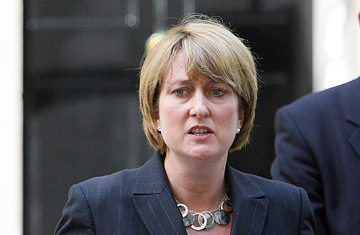
The new British Home Secretary Jacqui Smith speaks to the press in front of 10 Downing Street.
On June 28, Jacqui Smith, 44, Britain's freshly appointed Home Secretary, and the first woman ever to hold the post, arrived at her new quarters to find three battered red ministerial boxes on her desk. Their contents—essential reading to help her master her complex new brief—kept her busy until late in the evening. Then she returned to her London home and went to bed—to be woken a few hours later by the news that there had been an attempted car-bomb attack in the capital. Less than 12 hours after she'd taken office, Britain was facing a full-scale terror crisis, and she was the point person for it.
Smith's boss, Prime Minister Gordon Brown, had entered Downing Street only two days before, as Tony Blair left office after 10 years, and Brown, Finance Minister for all that time, assumed the job he had long cherished and for which he had long been marked. One theory, not ruled out by government security sources, is that the terrorists timed their plot to mark that transition. Brown and Smith were surely busy; soon after the first car bomb was discovered, a second was found in London and the next day, shaky footage of a Jeep in flames plowing into a Glasgow Airport terminal recurred on television newscasts like a bad dream.
The Prime Minister and his Home Secretary have been determined to respond without the use of apocalyptic language. Blair was sometimes accused of scaremongering to generate support for antiterror measures. "Terrorists are criminals whose victims come from all walks of life, communities and religious backgrounds," Smith told the House of Commons. "Terrorists attack the values that are shared by all law-abiding citizens." Though the words were not so very different from those used by her pugnacious predecessor John Reid, they were greeted as if they signified a radical departure from the Blair years. The opposition thanked Smith for her "dignity and calm." "She could say exactly the same thing [as Reid] and sound completely different," says a Home Office insider. The government, he adds, is much more aware than it used to be that "it's not necessarily what you're saying, but the way people hear it that matters."
It's no surprise to Smith's colleagues that she's won plaudits for dignity and calm. If there's been a criticism of her performance as a Minister (she held important jobs in the Education and Trade Ministries before joining the Cabinet as chief whip), it's that she can be calm to the point of boring. But the former economics teacher from Malvern who grew up in the British midlands and who represents a parliamentary constituency there also managed to avoid the factionalism that divided Labour. While Blairites and Brownites were fighting like cats and dogs, Smith was quietly making an impact.
Michael Howard, the former Conservative leader and Home Secretary from 1993 until Blair's 1997 election victory, says that quiet efficiency is really all that's required of Smith in the aftermath of the attacks. "You try not to get in the way, you try to make sure everything is coordinated, and you talk to the public in a calm and authoritative way. The difficulty comes in pitching legislation right, in getting the right balance between civil liberties and the proper protection of the public," he says. The Brown government has indicated that it will not rush new antiterror legislation in response to the latest plot. That suggests a new approach. Since the beginning of the decade, Britain passed four separate laws that extended the authorities' rights to investigate and monitor suspects and seize their assets. Blair did not have everything his own way; in 2005 he suffered his first-ever defeat in the House of Commons when members of his own party voted with the opposition to thwart an extension of the period police can hold suspects without charge from 14 to 90 days.
That term is now set at 28 days, a compromise that pleases nobody. Brown and Smith may again push for an extension, as part of a new terror bill already put in motion by their predecessors and due to be debated later this year. Other measures that might be included in the bill are the right to intercept calls and e-mails and to continue questioning suspects after they have been charged. The government has promised to consult on the new law widely and seek consensus on its terms. Shami Chakrabarti, the director of the human-rights group Liberty, often critical of Blair's approach, praises the new government for "resisting party politics or a knee-jerk rush to the statute books." Bob Marshall-Andrews, a Labour M.P. and bleak critic of the Blair Administration, says, "There is a completely different spirit in Parliament, and everyone can feel it. The signs are that we are in for a much more liberal and less authoritarian period of government."
All of this signals a rare honeymoon for the Home Office, a much-criticized department that habitually lurches from one controversy to the next. Few of Smith's officials have had a chance to thank her for lifting their spirits; the new Minister has been too busy with her duties to tour her domain. Not everyone will recognize Smith when she does; the Home Secretary's staff have been reduced to pinching outdated photos from her personal website to circulate around the building. But with terrorist groups having seemingly decided that Britain remains a rich target for their operations, whether or not Blair is the nation's Prime Minister, a lack of recognition won't trouble Smith for long.
—with reporting by Adam Smith
